Interactive mythbusting in Lane Cove
Posted on 9 March 2012 by John Cook
Last week, I was part of an interactive mythbusting evening at Lane Cove, Sydney. The evening was the brain child of Rebecca Jones from Sustain Me Consulting who organised a series of interactive sustainability workshops with Lane Cove Council. The idea of these workshops is to inspire local residents and businesses to take practical actions on environmental issues. You can check out some of the other workshops on her Facebook page, including a cook-off with Masterchef contestant Billy Law using leftovers to raise awareness about food waste.
Rebecca's approach is organising interactive workshops where the audience actively participate and contribute to the evening. So her suggestion was rather than give a prepared talk, we let the audience decide the agenda for the evening, decide what skeptic arguments they find most convincing and then it would be up to me to debunk any myths that arise. I have to admit that removing the security blanket of a prepared talk was a little unsettling - public speaking is hard enough as it is! But the idea of a purely interactive mythbusting evening did sound pretty cool albeit unpredictable.
As preparation, I put together a powerpoint of slides addressing the most popular climate myths (I will make this powerpoint avaiable online down the track but would like to tinker with it some more first). I had the list of myths on my iPad, each with it's own slide number, and when needed, I'd punch the number into Powerpoint and jump to the appropriate slide. Sounds good in theory, right?
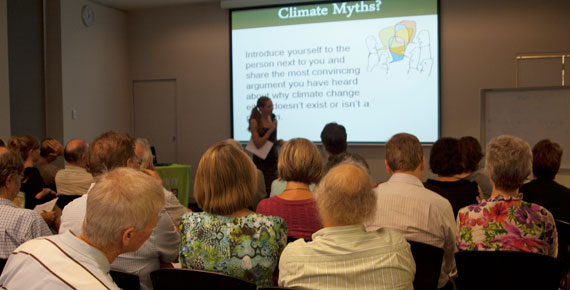
The evening began with Rebecca asking the audience for the most convincing skeptic arguments they'd heard about why climate change isn't a problem. The first myth the audience suggested was "warming isn't happening". I was happy to hear this as I had a few slides on this topic, including Dana's animated Escalator and one of my personal favourites, Total Heat Content. A number of other myths came up as well - the reliability of the surface temperature record, global warming being good, natural cycles, the usual suspects.
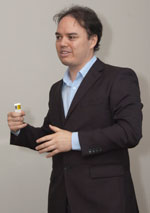
No poker face
Rebecca asked for a show of hands on which myths they had encountered, to narrow it down to three myths to address. I noticed that she failed to ask for a vote on "warming isn't happening" and pointed that out. However, Rebecca sensed my enthusiasm to address that particular myth and instead scrubbed it from the list, saying she wanted to make it more difficult for me. Curse my lack of a poker face! Sorry, Dana, the Escalator didn't get a chance to shine that night.
The philosophy I take when debunking myths is that responding to misinformation doesn't need to be a combative, aggressive experience. On the contrary, responding to misinformation is an opportunity for teachable moments, placing the myths in the broader context of the full body of evidence. After I debunked each myth, the audience voted on whether they considered the myth busted.
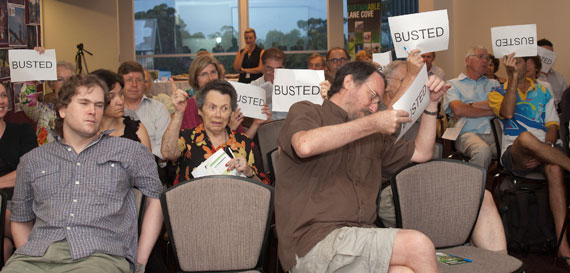
Most of the audience held up the 'busted' sign although there was one guy in the front row who was never swayed (you can see him stoutly sitting on his hands in the picture above). But the interesting (and in hindsight unsurprising) result was when Rebecca asked how many people changed their mind. Throughout the night, only one person indicated changing their mind, after encountering some information they weren't aware of previously.
It brings to mind when the late Stephen Schneider spoke to a room of 52 climate skeptics and at the end of the evening, only one person reported changing their mind. This effect has even been quantified in psychological research - when Republicans who believed Saddam Hussein was linked to the 9/11 terrorist attacks were shown conclusive evidence that there was no link, including a quote from George Bush, only 2% consciously changed their minds.
Following the myth busting, a local Lane Cove resident and her son presented examples of specific actions their family took to reduce their carbon footprint. It was a great way to structure the evening - a climate message is incomplete without either the science or the solutions (and the young boy worked their powerpoint presentation better than I was able to). The interactive element made the evening engaging for the audience (and for me). Many thanks to Rebecca and Lane Cove Council for inviting me to participate in the mythbusting evening.
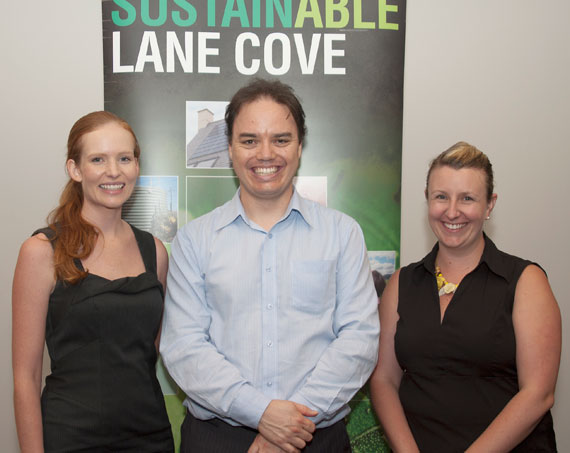
Rebecca Jones from Sustain Me Consulting, John Cook and Corinne Dickinson, Waste and Environmental Education Officer from Lane Cove Council.































 Arguments
Arguments





















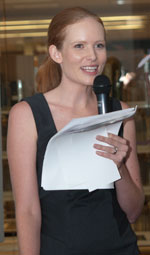


 0
0  0
0






Comments